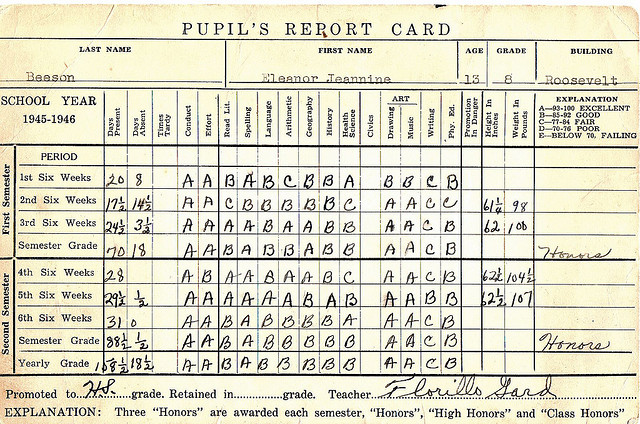It’s different when it’s one of your own. Mr Clarke could talk all he liked about conditions for the working classes in Victorian London, but the minds of the girls lay elsewhere.
About four metres above their heads, to be precise.
According to the school’s website, Camborough Academy “combines modern classroom facilities with the delights of studying in an historic environment”. The girls of Lower Remove A could therefore sit in their modern classroom facilities, absorbing Mr Clarke’s words of O-Level wisdom, whilst upstairs the Headmaster prowled around his ever-so-historic study – the only flaw in this impressive blend of ancient and modern being the relative lack of sound-proofing afforded by the floorboards that separated the two.
In usual circumstances, of course, there was little problem. The Headmaster was not wont to scream at the top of his voice at visiting parents; members of staff usually avoided excessive histrionics when faced with the Lower Remove on even their most giggly and uncooperative of days.
But traditional schools have traditional means of maintaining order amidst the potential chaos of 300 teenaged girls. An elaborate pyramid of punishments had been devised over the years to cajole and control the young ladies. You could be sent to stand in all manner of locations, from the corner to the corridor to outside the common room. Lines could be submitted, from careful copying of ancient Latin verse, to mundane repetition of the “I must not” variety. Work Detentions could keep you back after school to complete unsatisfactory work; Punishment Detentions could detain you for breaches of school rules. Housemasters could lecture.
And the Headmaster could cane.
Not that he did, often. At least, not in comparison to some schools. Once a week, once a fortnight perhaps, a trembling girl made her nervous way up the winding staircase opposite Lower Remove A’s door, descending more timidly five, ten minutes later to scurry back shame-faced to the lesson from which she had been extracted.
And in the meantime, every stroke, every plaintive resulting yelp, resonated through the wooden floor, and into the sympathetic ears of the girls in the classroom below.
This particular batch of young ladies were coming to the end of their first term at Camborough, in the archaically named “Lower Remove”. Bright girls, clever enough to pass the rigorous entrance examination. Particularly bright in the case of this, the “A” form – the top stream, the most academically gifted. Indeed, it was said that the Headmaster viewed their indirect exposure to the school’s punishment regime as a good thing: after all, it might focus the minds of the best of his youngest generation of pupils if they understood what befall their most unruly peers. From a distance.
Yet it could scarcely be said to be “from a distance” today, when the girls’ eyes took in the empty desk at the front right-hand corner of the classroom. Recently vacated by an ashen-faced Alexandra. The Head Prefect had knocked politely at the door, some five minutes after the start of the lesson, and left a folded yellow sheet of paper with Mr Clarke. He’d read it, slowly, then placed it in the desk drawer. With a hint of sympathy in his voice: “Miss Etterington, please report to the Headmaster’s study.”
Had she known it was coming? Possibly. Presumably? She knew the rules about smoking: the one red line that no-once could cross, and rightly so, some might say. Mrs Fearn had scarcely given the impression of sympathy when her eyes had alighted on the unopened pack of Marlboros during that morning’s unexpected desk inspection.
But nothing could have prepared the young girl for the moment when that door had swung open; for when had Clarke read the dreaded yellow slip; for when his eyes had turned to her.
It hadn’t started yet: was the Headmaster lecturing her, listening to her? Could she yet escape?
And then the scrape of the chair, being moved into position above them.
Listen to Clarke. Concentrate. Block it out. “The Factory Act of 1833 was a major step forward, banning factories from employing children under the age of nine.”
Whack.
Usually some abstract girl being punished. Easy to block out. Not this time. This time, they knew.
“Youngsters between nine and thirteen were limited to eight hours of work, and had to be given two hours of education per week.”
Whack.
A howl, this time, plainly audible.
How awful it must be. She’s a good girl, really. Two strokes will be enough. The girls glanced at one another, wincing.
“…yet there were only four of these new factory inspectors to look after the whole country.”
Thwack. Louder.
Was that sobbing? Mental hugs, flying through the ceiling. Did she know they were listening, worrying, counting her strokes? Praying that it couldn’t be _that_ bad.
“Next came Lord Shaftesbury’s Mines Act. 1842. You should be grateful to Lord Shaftesbury: he banned women and youngsters from working underground.” As if their minds were on his lecture.
Whack. So loud it could have been in the room. Dear goodness, a fourth. Alexxxxxx… Loud sobbing now. Even Clarke glanced upwards, his eyes returning first to her empty chair, and then to his notes.
They listened for the sound, yearning for silence.
“Finally, the Ten Hour Act of 1847, regulating the maximum working day for women and children in factories and mills.”
Nothing.
Counting the seconds.
Surely now?
A scraping of the chair. Nervous glances flying across the room. A collective sigh of relief. She must have stood up. Fingers uncrossing: it must be over.
“Across the Irish Sea, of course, came the potato famine of 1845. That brought pressure to bear for the repeal of the Corn Laws, which Peel forced through parliament in 1846 aginst the wishes of many of his own party, before resigning four days later.”
The door swung open.
“Ah. Miss Etterington.”
A pale, frail Miss Etterington. Avoiding the eyes of her compatriots. Walking slowly, gingerly.
“Do take a seat.”
Easier said than done, as he knew. They watched: she winced, adjusting her position. Elbows on her desk, supporting her face.
They could see the tear stains – would have wiped them away for her, if they could.
“So, Amanda, a quick test. The Mines Act. What year?”






